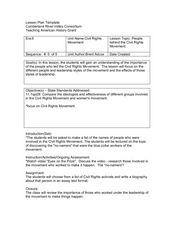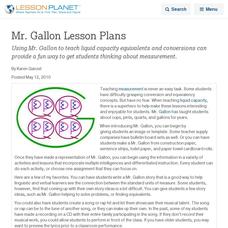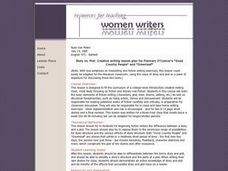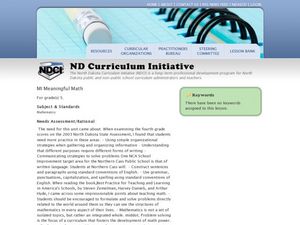Curated OER
A Valid Conclusion? Testing and Reporting on Hypotheses Using the Scientific Method
Students explore importance of accuracy in reporting, focusing particularly on articles documenting scientific discoveries, and practice scientific method by conducting experiments to test and report on scientific hypotheses.
Curated OER
Robinson Crusoe: The Original "Survivor"!
Fourth graders read and analyze Robinson Crusoe by Daniel Defoe, and participate in problem solving activity similar to television show, Survivor. Eight lessons on one page.
Curated OER
Justice Demands an End to Segregation, But it Does Not End
Students define human rights and describe how it applies to politics, economics and cultural rights. As a class, they watch a video how the Constitution was made and discuss its purpose. In groups, they present information to the class...
Curated OER
The Muckrakers Interdisciplinary Unit
Eighth graders complete an Interdisciplinary Unit on the Muckrakers and the Progressive Movement. Students describe life in America and how Progressive Reformers changed it. identify specific problems and propose solutions. Students...
Curated OER
Eating Out
In this eating out instructional activity, students practice matching ten food items on the right to their appropriate pictures on the left.
Curated OER
My Feelings!
In this feelings instructional activity, students view ten pictures of people showing different types of feelings the left of the instructional activity and match the pictures with the actual words on the right.
Curated OER
Is There/Are There
In this questions and answers worksheet, 4th graders analyze eight pictures in order to ask a question to go along with the answer to the question already stated with each picture.
Curated OER
Water Conservation
Young scholars identify ways to conserve water. For this environmental lesson, students use a water use checklist to identify how much water they use in one day. Young scholars analyze the data and brainstorm ways to conserve water.
Curated OER
Creating Sentences with Onomatopoeia Words
Third graders create sentences. In this sentences instructional activity students use onomatopoeia words to write sentences. They make a movement to match their onomatopoeia word. The students discuss why an author might use onomatopoeia...
Curated OER
People behind the Civil Rights Movement
Learners identify the people actively involved in the Civil Rights Movement. In this United States History lesson, students watch the video "Eyes on the Prize" then participate in a class discussion about the video. Learners also select...
Curated OER
Earth Day Lessons With The Right Stuff
Earth Day lessons provide a great way to teach students about the significance of the event, and how they can make a difference.
Curated OER
Mr. Gallon Lesson Plans
Using Mr. Gallon to teach liquid capacity equivalents and conversions can provide a fun way to get students thinking about measurement.
Curated OER
Word Play
Students define the steps of the formal writing process, consider the value and quality of the work done by Anne Frank in her personal diary, and create their own diary entries using the writing process outlined in class.
Curated OER
Blocking Trade, or Blocking Aid?
Young scholars examine various foreign conflicts in which the United States intervened, focusing on the causes of the conflicts, the United States' justification for entering the conflicts, and the outcomes of these interventions.
Curated OER
Shake, Rattle and Roll
Sixth graders explore the causes and effects of earthquakes. They also collect and analyze data in graphs. They also use the Internet to research earthquakes
Curated OER
Torts
Students examine tort law and defenses to negligence claims. They read case studies, participate in a mock trial, answer questions about the case summaries, and present information to their group about tort law.
Curated OER
What's Eating Titanic?
Students, in groups, research the bio deterioration of the Titanic. They write a report focusing on the rusting of the Titanic and estimate the amount of time it will take for the Titanic's bow section to completely dissolve.
Curated OER
The Invisible People: American Art and Literature Represents the Marginalized and Disenfranchised
Students view various pieces of art and sculptures which demonstrates people who are marginalized and invisible. While viewing the art, they are read excerpts of different pieces of literature in which they determine why the author or...
Curated OER
1920s Images and Ideals PowerPoint Project
Learners explore Teaching the American Twenties, noting fashion, life styles, Hollywood, key authors, key people, and key events. They explore the sites and note what they can identify from the time period for this collection. They write...
Curated OER
Story vs. Plot
Students, after reading and discussing the two texts by Flannery O'Connor, "Good Country People" and "Greenleaf," analyze the plot, tone, characters, themes and setting in each story. They write their own short stories dealing with a...
Curated OER
MI Meaningful Math
Fifth graders increase skills in organizing information for writing. In this organization lesson, 5th graders use correct grammar to design math problems for real world math.
Curated OER
The Race to Learn
Students explore the history of education and race in the United States. By researching Supreme Court cases dealing with race and education, students examine the ways in which these cases have reflected changing social and cultural norms.
Curated OER
The Whole Story
Students collect and convey information about a current event. By focusing on who, what, when, where, why, and how questions, students study to thoroughly analyze and report on important world events.
Curated OER
High Crimes and Misdemeanors
Students analyze the Constitution's wording regarding impeachment and discuss the impeachment process. They then design a survey based on student-generated questions about the charges against President Clinton and write a letter to the...

























